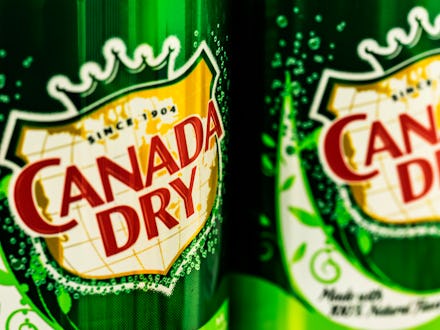Ginger ale isn't the stomach superhero you think it is

When I would have an upset stomach as a child, I knew the sweet, effervescent silver lining would be a tall glass of ginger ale. And this’d come fairly often since, as a kid, I threw up a lot (my body's inability to handle artificially-flavored dairy, a.k.a. the Trix yogurt I loved, had not yet been detected). It was also curious though, that what was essentially a liquid dessert to me was some sort of remedy; other illnesses usually landed me with a gross medicine. My mom, like so many, relied on the common go-to for stomach pain and nausea and while I always felt a little better afterwards, I’m not sure it really did anything but make me happy. It made me wonder: Does ginger ale really treat stomach pain?
To start, we have to discuss the benefits of ginger, which are deeply grounded in science. In addition to boosting nutrient absorption from other foods and helping manage your blood sugar levels, a 2019 NIH review of ginger’s effects on the gastrointestinal system confirms it can indeed help relieve intestinal issues, which is why my mother poured it up for me frequently. Even though every immigrant child knows how much their mothers revere ginger ale, is having the soda as effective as a nibble on the actual root?
“The answer to whether or not ginger ale will help relieve the symptoms of an upset stomach depends largely on the setting and context in which you’re using it,” says Jaclyn London, a Manhattan-based registered dietitian, nutritionist, and of head of nutrition and wellness at WW, a weight management and fitness mindset company. “Ginger itself has been shown to help alleviate nausea thanks to gingerol and shogaol, antioxidant-compounds found specifically in the ginger plant that work within your body’s GI tract and may help to ease discomfort through a number of biochemical pathways,” London says, adding that it also supports motility, which means it gets everything moving from your stomach to your small intestine.
While ginger root definitely helps with intestinal issues, there's a caveat for people who swear by it — many ginger ales don't actually have any ginger in them. Some use artificial flavoring, and some use ginger that has been processed so much that it is no longer beneficial to you. Sit with that for a minute. Your stomach savior might be at least somewhat of a placebo.
In fact, Canada Dry — arguably the most popular brand of ginger ale — has been sued several times over the amount of ginger in its soda, mostly because it says “made with real ginger” on every can but doesn’t have any of the item ingredient’s benefits. The company does make its product with actual ginger, but only after reportedly destroying its nutritional value by boiling it in ethanol, which is a truly tasty defense they actually mounted in court.
That being said, some sodas do contain unprocessed ginger root, like the truly tasty Jamaican-inspired brand Reed’s, which has 2000mg of ginger per can, which means nothing to you and me except to contrast with Canada Dry who declines to even tell anyone how much ginger extract (not even the root, y’all) they use according to a spokesperson in a 2019 transcript from the U.S. District Court in Northern California. while others are artificially flavored, but you might want to consider ginger ale’s more potent sister next time your stomach is in knots. Ginger beer is brewed with real ginger for three days (instead of just blended like soda) and is much spicier and more concentrated — and now I’m thirsty.
It’s important to note that if you live with diabetes or any condition that prohibits sugar. sodas are a hard no, even if they are caffeine-free, like ginger ale is. Also, any kind of sugary soda could also make you sicker in some cases, especially on an empty stomach. “Swilling ginger ale may have the opposite effect thanks to a quick hit of sugar moving straight to your gastrointestinal tract, which can sometimes be the cause of GI upset,” London says, adding that if you're going to have soda (with real ginger in it) take it slow with sips, and don't chug it.
Despite ginger’s health-halo, kid me was partially right — ginger ale is still a delicious sugary soda. “A better option is to use ginger regularly when cooking to reap all of ginger’s other myriad benefits, and try plain, unsweetened ginger-infused water or tea for stomach upset,” London says.
The best option to soothe nausea or an upset stomach, London suggests, would be to have a glass of freshly brewed ginger tea or homemade ginger soda. “If you’re keen on bubbles, opt for ginger-infused sparkling water which you can buy or make at home,” London says. “The beauty of this alternative is that you’ll get the natural sweetness from the tea itself while limiting your overall intake of added sugar, making it both low risk for worsening any symptoms while providing some soothing benefits.”
Ginger is a Lamour household staple: Several boxes of tea and candied ginger sit waiting to become a beverage, snack or cocktail garnish. Plus, we have the actual root in the crisper at all times for dinners and desserts (and again, cocktails). And of course, we stay stocked with the ale, for pleasure and “medicinal” purposes. Regularly using the root as a preventative measure is a great, medically-backed idea — and a delicious one if your tastebuds concur. Since I unwittingly am following London’s advice — to use ginger as a larger part of your preventative health versus as a quick fix — my adult tastes may be the reason for my stomach’s chill attitude these past years.